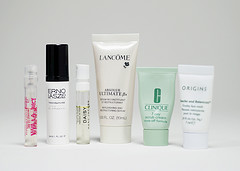
 We’ve been talking a lot about preservatives lately, mainly, about how they can be harmful to your health and how some have carcinogenic properties. The fact is, beauty products have to have some preservatives to protect us from bacteria and molds. The question is, which are least likely to have harmful effects?
We’ve been talking a lot about preservatives lately, mainly, about how they can be harmful to your health and how some have carcinogenic properties. The fact is, beauty products have to have some preservatives to protect us from bacteria and molds. The question is, which are least likely to have harmful effects?
The risk of bugs in your creams and lotions is real. Just recently the FDA warned that Clarcon skin products contained harmful bacteria that could cause infections and recommended all recent buyers to throw the product away. “Without preservatives,” writes Dr. Leslie Baumann, chief of the Division of Cosmetic Dermatology, “our products would quickly be colonized by all sorts of nasty bacteria, mold, and fungi.”
Bugs that get into our products can put us at risk for infections like Strep, Tetanus, gangrene, conjunctivitis, or allergic reactions. According to The Beauty Brains, microbes will grow in almost any environment that contains water, so once any product is opened and exposed to moisture in the air, microbes can grow. “Self-preserving” products may use some natural preservatives, but these may be effective only against certain microbes and not others, leaving you at risk. Cosmetics stripped of preservatives require refrigeration and can expire as quickly as milk, as well as carry an increased risk of contamination.
So what’s a good preservative, and what’s not? First, it helps to know that they come in two types-natural and synthetic. Natural preservatives include essential oils, extracts, vitamins, and salts like potassium sorbate and silver citrate, which may have fewer health risks. Shelf life may be shorter than with synthetics, but is typically long enough to finish up the product if you’re using it regularly. Synthetic preservatives are man-made and include parabens, urea derivatives, isothiazolones, halogen-organic actives, and others like EDTA, phenoxyethanol, and DMDM-Hydantoin.
We recommend you avoid parabens, because of their potential connection to breast cancer. Ureas and hydantoin DMDM have been linked with dermatitis and may release formaldehyde. Even phenoxyethanol, which is considered a safe alternative to parabens, has been restricted in Japan and the EU because of its potential mutagenic effects. Sadly, though they are effective against bugs, it seems most synthetic preservatives carry some health risks-especially since we are exposed to them everyday in several products.
Most natural preservatives, like vitamins and essential oils, are free of any toxic effects, and still can be quite powerful against microbes. However, don’t expect them to last for more than a year in most cases. Look for organic and natural products, and be sure to check the labels. Sometimes manufacturers put the words “natural” or “organic” on products that still contain toxic synthetic preservatives. If they have an “use-by” date, be sure to throw them away after they’ve expired. Some suggestions: Boscia, Garden Girl Skin Care, Skin Botanica, and Real Purity. Natural Solutions has several other recommendations as well.
Do you have a favorite product with natural preservatives? Let us know.
Photo courtesy of Kate Proulx via Flickr.com.

